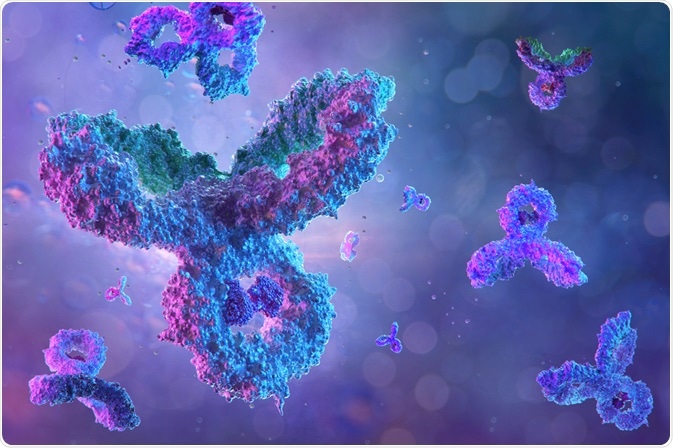Antibodies have been used for a long time in the prophylaxis and treatment of infectious diseases. The reason for this is that antibodies have an important role in guiding the effector mechanisms of the immunity against the pathogens they target.
Yet, there are some limitations to this therapy such as high cost, availability of antibiotics as cheap alternative drugs, and allergic reactions. Development in biotechnology methods has solved, in part, some of these issues. Currently, there is a great potential to use antibodies against infectious diseases and cancer.

Antibodies. Image Credit: Corona Borealis Studio/Shutterstock.com
Antibody Technology Development
There is a growing interest to revive the therapeutic potential of antibodies during the last few years. Antibody technology represents approximately a fifth of all biopharmaceuticals in development. Although there is in-depth research for using antibodies against AIDS and cancer, these antibodies were not successful in providing a definitive cure for AIDS or cancer, and if some of these have remarkable efficacy, they, unfortunately, have significant side effects. Moreover, many bacteria such as extreme drug-resistant Mycobacterium tuberculosis, and methicillin-resistant Staphylococcus aureus acquired resistance to many antimicrobial drugs.
In contrary to traditional therapeutic agents, antibodies have two unique characters which make them highly attractive. The first advantage is low toxicity because the body normally produces antibodies which means they are native to the body. The second advantage is exceptional specificity, which enhances the potential of directed targeting, making them ideal for the treatment of cancer instead of using nonselective chemotherapy or radiotherapy.
Only in the 1960s, researchers began studies to assess the use of antibodies against cancer when they tried to characterize the unique surface markers of cancerous cells, which can be targeted using polyclonal sera. However, these studies did not succeed because of the inherent issues linked with using sera in humans.
In 1975, hybridoma technology was first reported, and researchers thought that it may be the answer to the problems facing polyclonal sera. Individual high-affinity, specific monoclonal antibodies were first produced via immortalizing murine B lymphocytes through fusion with a myeloma cell. However, these monoclonal antibodies elicited an immune reaction against the foreign antibody and the generation of human anti-mouse antibodies. This also led to faster clearance of the delivered antibody and allergic reactions, and, occasionally, tumor escape and neutralization of therapy.
The advance of genetic engineering techniques has helped to overcome such adverse reactions. This can be accomplished via converting murine and other non-human antibodies into antibodies, which could elicit a low or even trivial hypersensitivity response through substituting non-human regions with the corresponding human region.
In addition to reduced immunogenicity, chimeric antibodies facilitate the involvement of the immune effector functions such as phagocytosis and antibody-dependent cellular cytotoxicity in a more effective way.
Current application of Antibody Therapy
Although there are mixed results of using serum therapy with hyperimmune sera, it is still used for the treatment or prophylaxis of various viral and bacterial diseases. It has been recommended for prophylaxis of viral diseases such as hepatitis B, respiratory syncytial virus, and cytomegalovirus as well as for treatment and prophylaxis of botulism, and tetanus, where it is used as an anti-toxin.
Additionally, it is also widely used as an anti-venom for the treatment of snakebites and stings. Intravenous immunoglobulin, which is a new form of antibody therapy, prepared from human polyclonal antibodies which are collected from a great number of healthy donors, and unlike hyperimmune sera, are not enriched for antibodies specific to any particular pathogen.
Although intravenous immunoglobulin was first administered to patients with antibody deficiency, it is useful in the treatment of many inflammatory and autoimmune diseases because of its immunoregulatory characters. Intravenous immunoglobulin is also effective in sepsis treatment, where it could decrease pathology via suppressing inflammation. However, many meta-analyses and clinical trials showed conflicting results of intravenous immunoglobulin efficacy.
Many studies reported that intravenous immunoglobulin can protect against as well as treat complications coming from cytomegalovirus infection following organ transplantation. Yet, in vitro and in vivo studies, as well as large-scale clinical trials on the efficacy of intravenous immunoglobulin, are missing. Commercial intravenous immunoglobulin was able to neutralize Staphylococcal and Streptococcal superantigens, opsonize bacteria in vitro. There are reports of positive case studies in human patients, however, there are no conclusive clinical trials.
Sources:
- Bass, E. B., et al. "Efficacy of immune globulin in preventing complications of bone marrow transplantation: a meta-analysis." Bone marrow transplantation 12.3 (1993): 273-282.
- Carbone, J., et al. "The potential impact of substitutive therapy with intravenous immunoglobulin on the outcome of heart transplant recipients with infections." Transplantation proceedings. Vol. 39. No. 7. Elsevier, 2007
- Chan, Conrad En Zuo, et al. "The use of antibodies in the treatment of infectious diseases." Singapore Med J 50.7 (2009): 663-672.
- Dillman, Robert O., et al. "Therapy of chronic lymphocytic leukemia and cutaneous T-cell lymphoma with T101 monoclonal antibody." Journal of Clinical Oncology 2.8 (1984): 881-891.
- Keller, Margaret A., and E. Richard Stiehm. "Passive immunity in prevention and treatment of infectious diseases." Clinical microbiology reviews 13.4 (2000): 602-614.
- Köhler, Georges, and Cesar Milstein. "Continuous cultures of fused cells secreting antibody of predefined specificity." nature 256.5517 (1975): 495-497.
- Lin, Michael Z., Michael A. Teitell, and Gary J. Schiller. "The evolution of antibodies into versatile tumor-targeting agents." Clinical cancer research 11.1 (2005): 129-138.
- Negi, Vir-Singh, et al. "Intravenous immunoglobulin: an update on the clinical use and mechanisms of action." Journal of clinical immunology 27.3 (2007): 233-245.
- Presta, Leonard G. "Engineering of therapeutic antibodies to minimize immunogenicity and optimize function." Advanced drug delivery reviews 58.5-6 (2006): 640-656.
- Schroff, Robert W., et al. "Human anti-murine immunoglobulin responses in patients receiving monoclonal antibody therapy." Cancer research 45.2 (1985): 879-885.
- Werdan, Karl. "Intravenous immunoglobulin for prophylaxis and therapy of sepsis." Current opinion in critical care 7.5 (2001): 354-361.
Further Reading
Last Updated: Jun 22, 2021